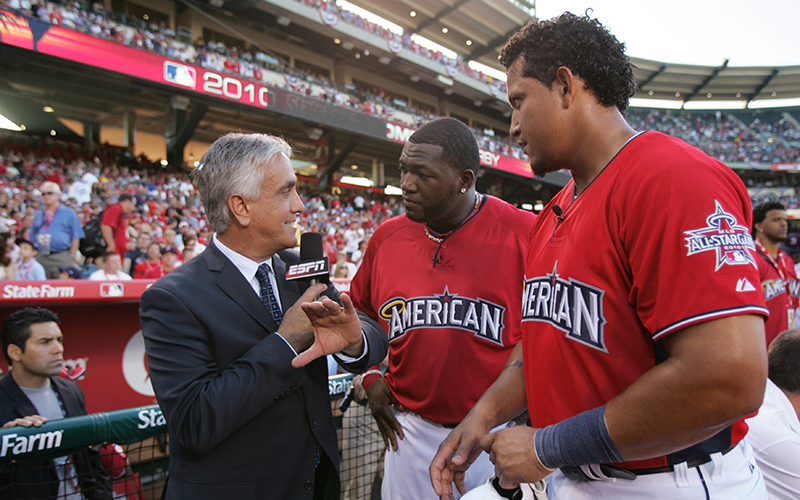
ESPN analyst Pedro Gomez is adjusting to life without baseball, but he looks forward to interviewing players again, as he did in 2010 when he spoke with David Ortiz, center, and Miguel Cabrera at the State Farm Home Run Derby at Angel Stadium of Anaheim. (Photo by Michael Zagaris/Getty Images)
PHOENIX – For Pedro Gomez, the analogy came easily.
“This was a lightning bolt.”
In more than 30 years covering baseball, first for newspapers and now ESPN, Gomez has seen just about everything. But nothing produced a jolt quite like March 12 when Major League Baseball abruptly suspended spring training and put the 2020 season on hold amid the COVID-19 pandemic.
“This just came out of nowhere,” Gomez, a baseball writer since 1990 and an ESPN baseball insider since 2003, said via Zoom. “It was like … boom! Everything just came to a screeching halt all of a sudden.”
On that fateful morning, Gomez arrived at Mesa’s Sloan Park, where the Chicago Cubs train, to find it empty – nothing but silence rather than the usual sounds of spring training. Later that day, baseball joined the NBA, NHL and other pro sports in either postponing or canceling their seasons.
Despite no word on when baseball might resume, Gomez said he is trying to keep a normal routine, from working on home projects to grocery shopping with his wife while making occasional calls to managers and players.
“There’s nothing we could do,” said Gomez, whose son, Rio, plays in the Boston Red Sox organization. “ESPN is not allowing us to go out and do anything outside in the field, even if it’s in Phoenix where I live.”
Baseball fans saw a glimmer of hope when word leaked that MLB was discussing the “Arizona Plan,” which would place all 30 teams in the Valley and play games without fans at spring training stadiums and Chase Field, the retractable-roof home ballpark of the Arizona Diamondbacks. The climate-controlled Chase could house doubleheaders or even tripleheaders.
But just how realistic is it? Gomez believes baseball will find a solution, and it could include or resemble the Arizona Plan.
“There’s motivation on both sides, the players and owners,” he said. “Because the owners don’t get any television money (without a season), which is all they can make now. They can’t get ticket sales. They can’t get beer sales, food sales, concessions. Nothing like that. So the only money that they can make is if the games are on television. Then the national network deals kick in.
“On the players’ side, if there are games played – even if it’s 120 games played out of 162 – they are going to get three-fourths of their salary, basically.”
Gomez said money will be the ultimate motivator, as it often is in sports.
However, fans will have to rely on television and radio broadcasts to follow their teams.
Recently, more than 7,000 miles away from Phoenix in Taiwan, four teams in the Chinese Professional Baseball League put the concept to the test. Millions watched on television as the teams began play with cardboard cutouts, representing fans in the seats.
“I think it’s great, in a sense, Taiwan is playing games as long as it’s safe, and they have deemed it to be safe,” Gomez said. “I think it’s a great distraction. It lets the public know, ‘Hey, we might not be back, but here’s a sense of some normalcy and we’re on our way back.’ I think that’s how it will be viewed here.”
If a major league season unfolds without fans, Gomez believes reporters might join those fans in viewing from afar, then doing their reporting electronically.
“I believe postgame interviews are going to take place like what we’re doing right here” on Zoom, he said. “It’ll be a Zoom-type of press conference with 30 people in a gallery, 25 reporters, a manager (and) a few players. It’s going to be very, very strange.”
The games wouldn’t feel the same, Gomez said, but they still would be reflected in the standings and the season can be salvaged, absent one-on-one interviews with reporters and the adrenaline rush provided by a packed house.
“The energy level just isn’t the same,” Gomez said. “So while the games will still count, it will be an entirely different season than anything we have ever seen. If they play. There’s still a lot of questions as to if they will play. But if they do, I think it’s going to be the most bizarre season in the history of the game, that will last our lifetime, your life and probably your children’s lifetime.”
Gomez vividly recalls being able to hear the bullpen phone ringing during a live broadcast of a game between the Baltimore Orioles against the White Sox in Chicago with no fans in attendance because of civil unrest over the death of Freddie Gray while in police custody. April 29, 2015, was the first game played in an intentionally empty stadium in the 145-year history of the major leagues.
But in light of the COVID-19 pandemic, Gomez said, if the season is played, rosters would likely have to be bumped from 26 players to 32 or 35 to handle the demand of playing multiple doubleheaders to squeeze in the season.
And every game would be played in an unfamiliar setting.
“It would still be bizarre because the games would not be played in the home cities, in all likelihood,” Gomez said. “They would not be played in front of fans, and there’s enough players I’ve talked to that say, ‘You get adrenaline from having people in the stands. There’s an adrenaline boost that comes with playing live in front of people, and it’s not nearly, remotely the same in front of an empty stadium.'”
After reflecting on the bizarre nature of a season and a world locked down, Gomez offered encouragement to future reporters and broadcasters, many who soon will graduate into an uncertain future.
“Don’t give up, and just be persistent,” Gomez said. “Find different ways to be able to do your job. It’s not going to be easy by any means, because you are not going to be able to go to a facility and talk to players and coaches and get other sources in that way. So you’ve got to truly be creative and try to find different ways. It is one of the greatest times ever in the business … you are actually part of history, so to speak.
“You are really part of history, and it’s always been part of one’s job to weave your way through and discover ways to get sources. And this is no different. It’s more challenging, but it’s the same message.”
